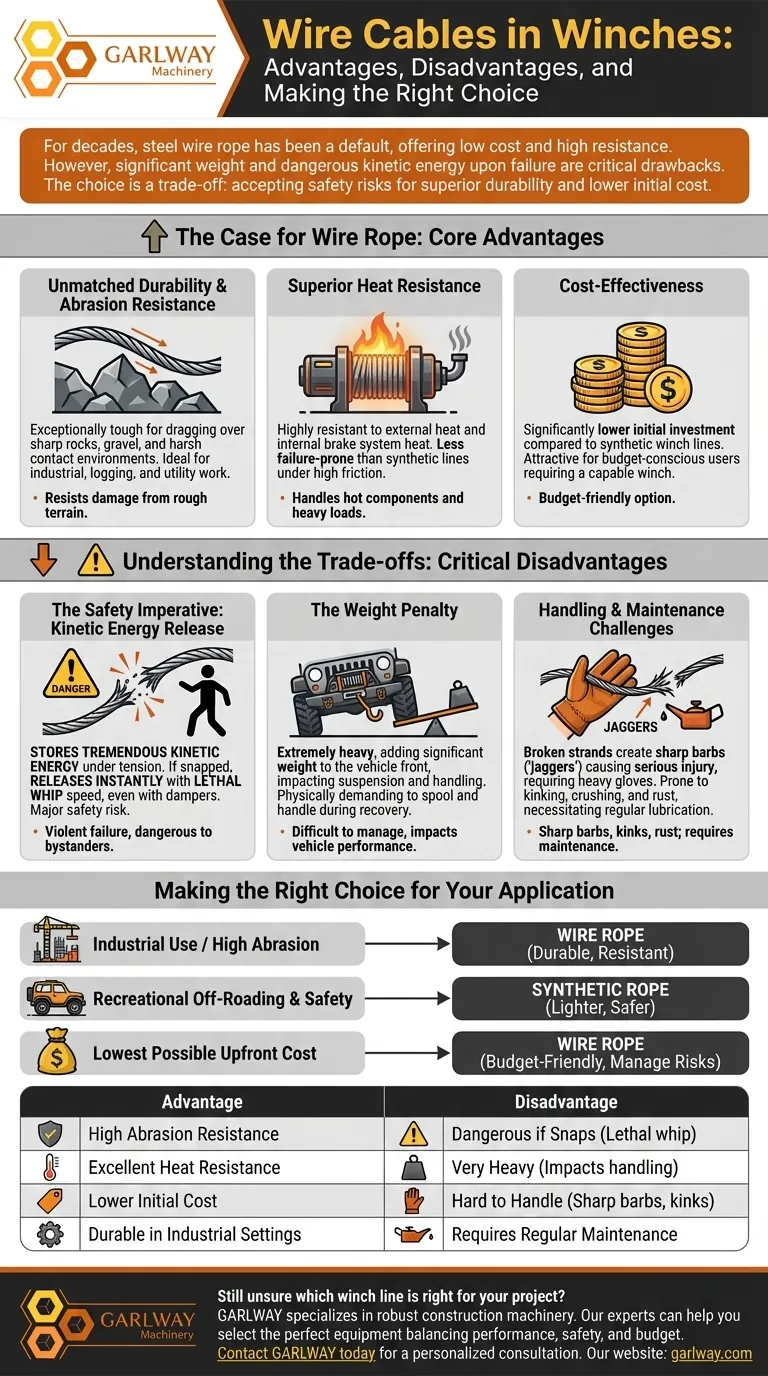For decades, steel wire rope was the default choice for winching, and it remains a viable option valued for its low cost and high resistance to heat and abrasion. However, its significant weight and the immense, dangerous kinetic energy it releases upon breaking are critical disadvantages that must be carefully considered.
The decision to use wire rope hinges on a fundamental trade-off: accepting significant safety risks and handling difficulties in exchange for superior durability in abrasive environments and a lower initial cost.

The Case for Wire Rope: Core Advantages
Wire rope's longevity in the market is due to a few key characteristics that make it ideal for specific, demanding applications.
Unmatched Durability and Abrasion Resistance
Steel cable is exceptionally tough. It excels in environments where the line might be dragged over sharp rocks, gravel, or other abrasive surfaces that would quickly damage a synthetic rope.
This makes it a reliable choice for industrial, logging, or utility work where the winch line is subjected to constant, harsh contact.
Superior Heat Resistance
Because it's made of steel, wire rope is highly resistant to heat. This is a crucial advantage in situations where the cable might come into contact with hot exhaust components or experience high friction over an obstacle.
It is also less susceptible to the internal heat generated within the winch drum's brake system, a known point of failure for synthetic lines.
Cost-Effectiveness
There is no denying the budget advantage of wire rope. It is significantly less expensive to purchase upfront compared to a synthetic winch line of equivalent strength.
This lower initial investment makes it an attractive option for users who need a capable winch but have a limited budget.
Understanding the Trade-offs: Critical Disadvantages
While durable and cheap, wire rope carries significant drawbacks related to safety, weight, and general handling that are essential to understand.
The Safety Imperative: Kinetic Energy Release
This is the single most important disadvantage. When under tension, steel cable stores a tremendous amount of kinetic energy. If the line snaps, this energy is released instantly, causing the broken cable to whip through the air at lethal speed.
Even with a winch damper, a failure is violent and extremely dangerous to anyone nearby. This risk alone is why many recreational users have moved away from wire rope.
The Weight Penalty
Wire rope is extremely heavy. This added weight on the front of a vehicle can negatively impact suspension performance and handling.
Furthermore, the weight makes handling the line during a recovery operation physically demanding. Spooling it out, especially uphill or through difficult terrain, is hard work.
Handling and Maintenance Challenges
Over time, individual wire strands can break, creating sharp barbs or "jaggers" on the surface of the rope. These can easily cause serious injuries to bare hands, making the use of heavy leather gloves mandatory.
Wire rope is also prone to kinking and crushing, which creates permanent weak spots in the line that compromise its strength and safety. It also requires periodic lubrication to prevent rust and corrosion.
Making the Right Choice for Your Application
Your choice of winch line should be dictated by your primary use case and tolerance for risk.
- If your primary focus is industrial use or high-abrasion environments: Wire rope is often the more practical choice due to its durability and resistance to cutting.
- If your primary focus is recreational off-roading and safety: The lighter weight and dramatically safer failure mode of synthetic rope make it the superior option.
- If your primary focus is the lowest possible upfront cost: Wire rope is the budget-friendly choice, but you must be fully aware of and prepared to manage its significant safety risks.
Ultimately, choosing wire rope means prioritizing ruggedness and cost over modern safety and ease of use.
Summary Table:
| Advantage | Disadvantage |
|---|---|
| High Abrasion Resistance | Dangerous if Snaps (Lethal whip) |
| Excellent Heat Resistance | Very Heavy (Impacts handling) |
| Lower Initial Cost | Hard to Handle (Sharp barbs, kinks) |
| Durable in Industrial Settings | Requires Regular Maintenance (Lubrication) |
Still unsure which winch line is right for your project?
GARLWAY specializes in providing robust construction machinery, including winches, concrete mixers, and batching plants, for construction companies and contractors globally. Our experts can help you select the perfect equipment for your specific needs, balancing performance, safety, and budget.
Contact GARLWAY today for a personalized consultation and discover how our solutions can enhance your worksite efficiency and safety.
Visual Guide

Related Products
- Electric and Hydraulic Winch for Heavy Duty Applications
- Electric 120V Boat Winch by Badlands
- 12000 lb Heavy Duty Electric Boat Winch
- Heavy Duty Electric Boat Winch Windlass Anchor
- Electric Hoist Winch Boat Anchor Windlass for Marine Applications
People Also Ask
- How do the rope winding methods differ between electric hoists and winches? Choose the Right Tool for Your Job
- How does the motor contribute to the winch's operation? Powering Your Heavy-Duty Pulling Needs
- How should the wire rope be arranged on the hoist drum? A Guide to Safe and Reliable Operation
- What are the pros and cons of electrical winches? Make the Right Choice for Your Project
- What factors should be considered when choosing a windlass? A Guide to Power, Type, and Safety
- Why might an electric winch be better for solo wheeling? Engine-Independent Lifeline for Ultimate Self-Recovery
- How do electric winches enhance operational safety? Mitigate risks with automated safeguards and remote control.
- What are some advantages of using a drum winch for anchoring? Boost Safety & Speed on Deck













